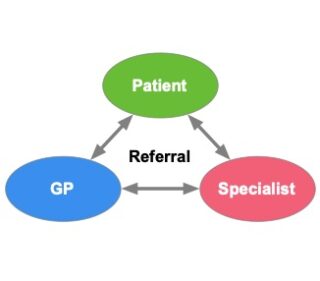Q Exchange
Referral Inequalities in Inflammatory Arthritis
- Proposal
- 2024

Meet the team
Also:
- Antoni Chan FRCP PhD Clinical lead, Consultant Rheumatologist at the Royal Berkshire Hospital
- Alex Benson, Project Manager
- Ofuase Diruisu, Project Officer, 5th Year medical student at Oxford University
What is the challenge your project is going to address and how does it connect to the theme of 'How can we improve across system boundaries?
People living with health inequalities may have most need and their ultimate health status and wellbeing may be worse. Referrals should include information from patients about how they feel and live to help their clinicinas help them.
R-Outcomes, and Tim Benson in particular, have worked with the Rheumatology Department at the Royal Berkshire Hospital for several years. This project is designed to enable scaling geographically and to other specialties.
We will collect structured PROMs data on referral of people who live with inflammatory arthritis from eight PCNs about health status, well-being, health confidence, social determinants of health, age-group, sex, living alone, ethnicity, language, deprivation level and other conditions. A summary report will be shared with the patient, consultant and GP. Clinicians will assess the value of this information including the impact on patient outcomes and experience. We will assess the impact of inequalities, as measured by social determinants of health.
What does your project aim to achieve?
Our project seeks to improve the referral process for the 100,000 patients referred annually in England with inflammatory arthritis (e.g., Gout and Rheumatoid Arthritis). Using Patient Reported Outcome Measures (PROMs) in prioritising patient care, we aim to ensure that those in most need receive timely and appropriate treatment.
Additionally, we will investigate the relationship between patients’ health status, well-being, confidence, social determinants of health (SDoH), age, sex, ethnicity, and language — to understand how these factors contribute to health inequalities. Through this analysis, we plan to develop a detailed action plan to evaluate the scalability of this pilot across the Integrated Care System (ICS), the potential for national expansion and application to other clinical specialties.
This project promises to provide valuable insights into improving patient outcomes and addressing health disparities within our healthcare system.
How will the project be delivered?
The project involves the Rheumatology department screening incoming referrals from targeted Primary Care Networks (PCNs). Patients from these PCNs complete a questionnaire, the anonymised results, which are processed by R-Outcomes Ltd into a report. This report is then personalised with identification details by the department and shared with the patient, referrer, and consultant. Follow-ups are conducted for non-responses, and the project team, responsible for PCN recruitment and training, periodically receives summaries of patient feedback.
Upon referral, patients are prompted to complete a detailed questionnaire covering their health and well-being, aimed at offering a comprehensive overview of their condition. The process ensures stakeholders—patients, referrers, and consultants—are kept informed through personalised reports, enhancing the treatment landscape based on direct feedback and regular data reviews to adapt and refine our approach, aligning it closely with patient and clinician needs.
How is your project going to share learning?
Our plan includes preparation of a detailed protocol, suitable for publication in a peer-review journal. We will also prepare a paper summarising the findings of the project for publication in a peer-review journal. For those seeking an in-depth understanding, a more extensive final report will be made available, offering a thorough examination of our findings and their significance.
We will present our findings at general and specialist rheumatology conferences.
We will collaborate closely with the EPSRC project: “Advancing machine learning to achieve real-world early detection and personalised disease outcome prediction of inflammatory arthritis. Engineering and Physical Science Research Council (EPSRC), grant number: EP/Y019393/1”. Their network will help maximize the impact with academic and clinical audiences.
How you can contribute
- We invite Q members with experience of inflammatory arthritis, as patients or clinicians, to help refine our approach. We seek personal experiences, professional opinions and feedback about the PROMs. This will help ensure our findings meet the needs of clinical and patient communities.
Plan timeline
| 31 Jul 2024 | Project initiation, PCN recruitment and methodology |
|---|---|
| 30 Sep 2024 | Survey testing, training and protocol paper |
| 31 Mar 2025 | All patient and clinician surveys distributed |
| 31 May 2025 | Completion of data evaluation and analysis |
| 30 Jun 2025 | Final report submitted and paper for publication |